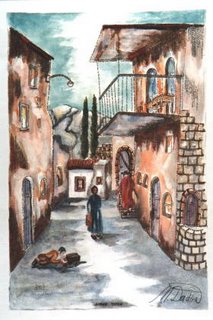
Woe to you who long
for the day of the Lord!
Why do you long for the day of
the Lord?
That day will be darkness, not light.
It will be as though a man fled
from a lion
only to meet a bear,
as though he entered his house
and rested his hand on the
wall
only to have a snake bite him.
Will not the day of the Lord be
darkness, not light--
pitch-dark, without a ray of
brightness?
"I hate, I despise your religious
feasts;
I cannot stand your
assemblies.
"Even though you bring me
burnt offerings and grain
offerings,
I will not accept them.
Though you bring choice
fellowship offerings,
I will have no regard for them.
"Away with the noise of your
songs!
I will not listen to the music of
your harps.
"But let justice roll on like a river,
righteousness like a
never-failing stream!"
(Amos 5:18-24)
Amos got it.
The eighth century Hebrew prophet would have a lot to say to us today.
He would not be our favorite newspaper editorialist, but he would be heard above the sound of our unending sermons, the church bells and the blaring organs or the congregational four-part harmony, sung so proudly.
Amos reminds us that God cares much more about the poor and the forces that make and keep people poor than God cares about worship, doctrine, traditions or the many issues that seem to consume the contemporary church.
God doesn't need or want our piety.
God wants justice. God is commited to fairness, equal opportunity on God's earth. God seeks to join hands with a people who will live and die for the same.
Listen in church today.
See if you hear the values of Amos.
If not, it likely is time to ask why not?
For some reason, I find myself agreeing wholeheartedly with this post... Amos is a prophet who never fails to inspire and challenge me, and the more I think about him the more I realise that the words of the book of Amos are relevant even today.
ReplyDeleteA recent article in Harper's discussed the Gospel of Thomas, and its similarities to Thomas Jefferson's version of the Bible (in which he removed the virgin birth, the resurrection and all of the miracles). The article reminded me of Larry's October 12th post, Jesus, the Unlikeable.
ReplyDeleteSitting in church today, I began to wonder: what if the Thomases were right, and all of this was unimportant compared to the true message of Christ?
That message was hidden in the sermon about the Gospel passage, and its reminder to "watch out!" for the return of the king. Alas, I feel this whispering reminder to care about the poor was lost amidst what seemed to be a greater concern with personal salvation.
Indeed, Larry. Amos got it.
- J
J, thanks for the reference to the latest Harpers magazine and the article about the Gospel of Thomas and Thomas Jefferson. Worth reading.
ReplyDeleteIt seems to me that Jefferson's understanding of the message of Jesus provides everyone a place where unity of action and policy coulb be crafted regardless of the inevitable differences in theology.
I found it interesting how the work of Ralph Waldo Emerson was also brought into the essay. The national "faith system" has always contained an important element related to the poor and the marginalized. . .at least until the past 25 years when such has been in decline in favor of a more avowedly sectarian emphasis that not only abandons the poor, but also excludes millions from full participation in the formation and application of broadly agreed upon
"national values."
Jefferson got it too.
So Amos got it right and the 8th century people of God didn't. Yet to the 1st century people of God and to all, really, God sent a virgin-born, miracle-doing Messiah who calls us to give as we have received.
ReplyDeleteSorry, but I don't see how Jefferson got it. It seems to me he missed it.
Brady, I believe Jefferson got it way ahead of his day because he pulled out the parts of the message of Jesus that would and could relate to and include everyone living in our constitutional democracy without placing one faith system above the other. That was his genius.
ReplyDelete